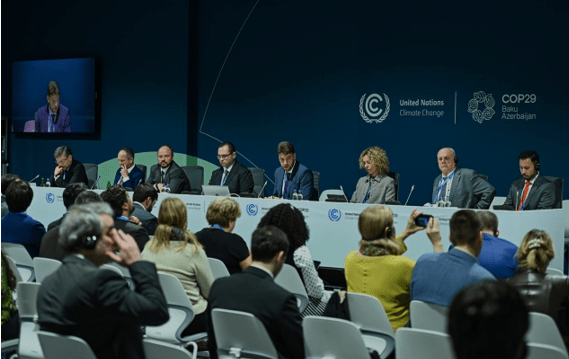By COP29 Media
At the Russian side event at COP29 in Baku titled “Russia’s Contribution to Strengthening Global Food Security,” Sergey Tverdokhleb, Deputy Chairman of the Committee on Climate Policy and Carbon Regulation of the Russian Union of Industrialists and Entrepreneurs, delivered a compelling argument on how closely the climate crisis is linked with the state of the global food security.
The event brought together key officials and leaders in various industries of Russia, as well as a number of international participants, to discuss some of the world’s most pressing issues.
Tverdokhleb stressed that, on the one hand, climate change affects agricultural productivity and food security. On the other hand, the unintended consequences from emerging climate regulations, in turn, affect food systems across the world.
“The impact of floods, droughts, and other climate-related disasters directly reduces crop yields in many countries,” he said. “Last month, several southern African countries declared the state of national emergency due to the loss of grain and livestock, leaving over 10 million people in acute hunger.”
At the same time, carbon regulation just like other unilateral trade restrictions is starting to have both direct and indirect effects on the global food security. “A classic example is the European cross-border ‘carbon tax’, which will increase fertilizer prices and reduce revenues for the budgets of developing countries, making it even harder for them to finance subsidies for farmers and consumers,” Tverdokhleb warned.
This echoes the idea first expressed by Andrey Melnichenko, the chair of the RSPP Committee on climate policy and carbon regulation. In his 2022 interview to Bloomberg, he recognized that the impact on sanctions on food security is a critical issue that requires immediate attention, adding that “projected fertilizer shipments lost to sanctions over 12 months would grow enough grain to feed more than 200 million people.”
On the bright side, Sergey Tverdokhleb highlighted the huge potential of agricultural climate projects to address both emission reduction and food-security challenges. “Nature-based projects in agriculture could reduce or offset at least 35–40% of global agricultural emissions. This dual benefit must be a cornerstone of international climate efforts,” he added.
Besides, several speakers emphasized the significant input of Russia’s food and fertilizer exports for the countries in the Global South. Its fertilizer exports rose 25% in the past year, enhancing food security for 1.2 billion people. “Russian fertilizers provide 22% of the nutrients used by farmers in these regions, underscoring their critical role,” Tverdokhleb noted.










